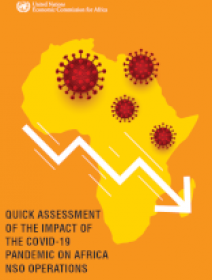A rapid assessment questionnaire composed of seven questions was sent to all the 54-member states of the Economic Commission for Africa to collect data on the impact of COVID-19 on statistical operations. Thirty-seven (37) National Statistical Offices (NSOs) completed the survey. The main findings are summarized as follow:
- Data collection operations have been significantly affected. Twenty-five per cent (42 out of 168) of surveys planned have been halted or suspended and a further 48 surveys postponed. Additionally, even where operations are ongoing, higher non-responses rates and low sample coverage are being observed. Besides, twenty-two per cent of Population and Housing Census activities planned were halted or suspended.
- Impacts on NSO working practices limit their resource and responsiveness. Business continuity measures adopted by NSOs include new working hours, limited staff numbers in the office, remote working and methodological adjustments. However, there are remaining challenges to address despite the quick response of NSO.
- High demands for data and supporting activities. National Statistical Systems, and particularly NSOs, are overwhelmed by requests for data, statistical services and information, which include projections of affected populations, visualizing information and socio-economic impacts to support and inform responses to the pandemic.
This survey highlights a number of high-level general areas where countries need the following additional supports as a result of these impacts:
- Technical assistance and capacity building. NSOs will need to rapidly adjust their skills and methods to adapt new challenges such as new data collection methods, higher non-response rates and maintaining time series.
- Financial support. Increased demands, the halting of activities, disruptions to planned activities, and foreseen Government reallocations of budget to address COVID-19 responses mean that NSOs expect significant budget pressures.
- Support for provisions of collaborative solutions. Countries’ challenges will diverge due to local circumstances, but there are commonalities that require collaborative solutions that are relevant, methodologically robust and adaptable and fulfil the opportunity to modernise National Statistical Systems, leveraging on modern technologies.
Pan African organizations and partners will need to work together to deliver the rapid and wide-ranging support required. Some actions are already in place, including the reinstatement of the African Statistical Coordination committee with a purpose to better coordinate country support.

